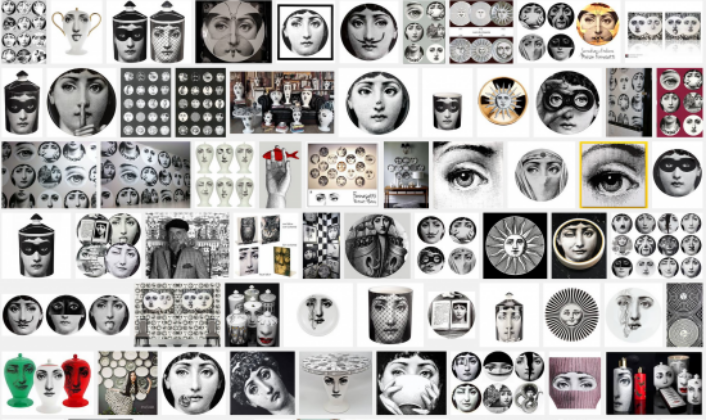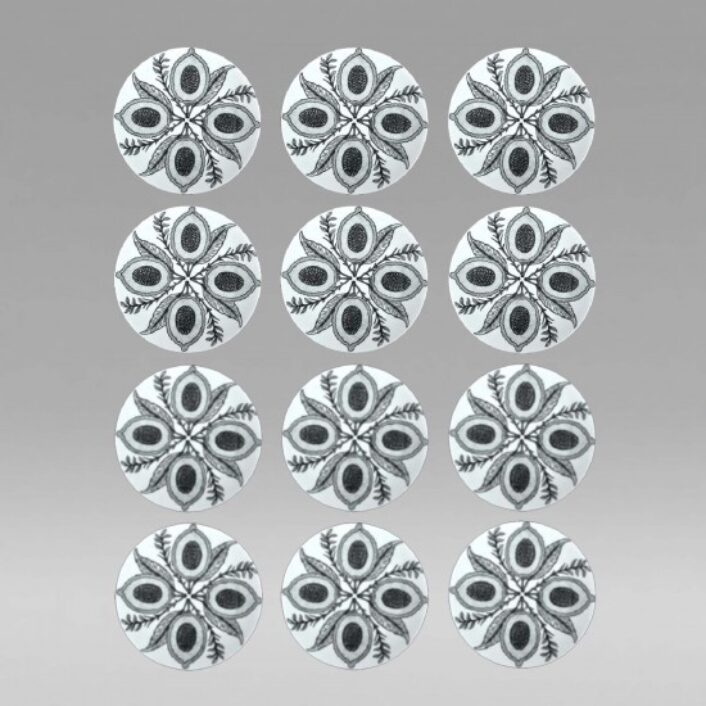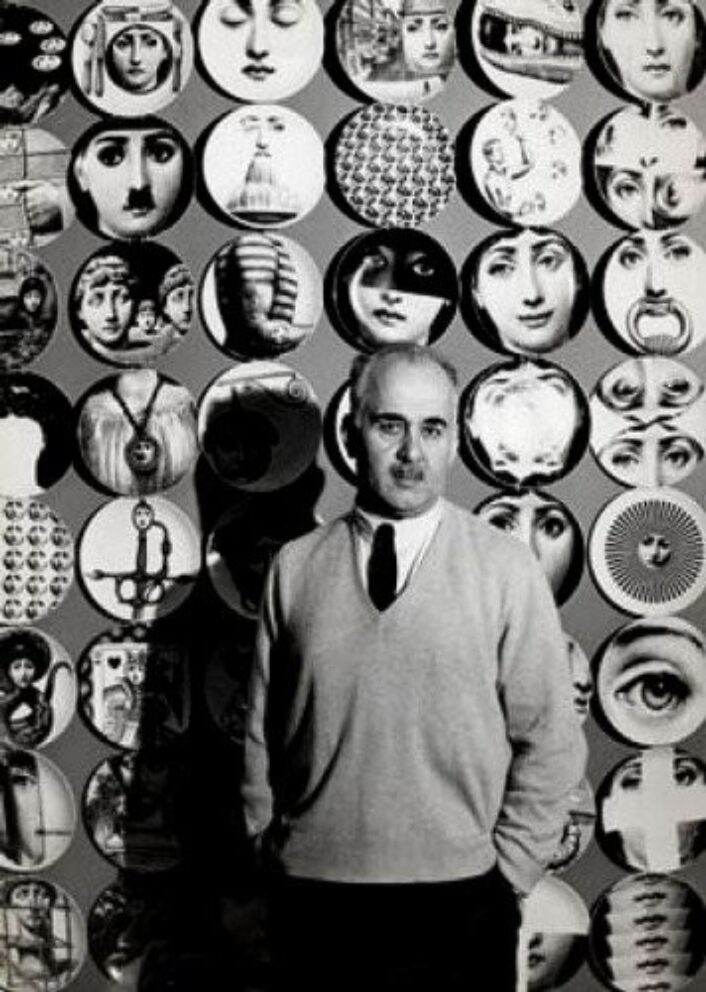Design
Piero Fornasetti: Designer of Dreams
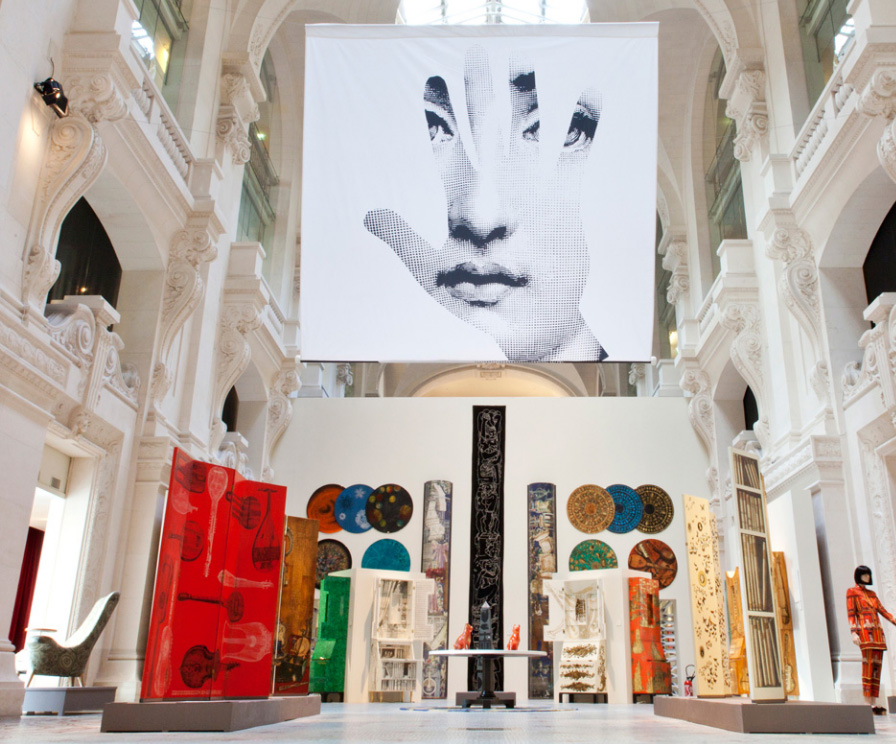
The “100 Years of Practical Madness” exhibition made its way to the main nave of the Les Arts Decoratifs which was on view from March 11th to June 14th of 2015. Photo courtesy of Fornasetti.
Piero Fornasetti was known throughout the world for his illustrative black and white ceramics and furniture pieces. Fornasetti worked with glass, fabric, porcelain, and wood. His designs encompassed all categories of furniture: cabinets, chairs, trays, umbrella stands, and china.
Through his self-taught methods and rebellion against norms, Piero Fornasetti created a world of his own and allowed others who delighted in his “madness” to join him. Fornasetti pieces were always witty and imaginative. He clearly favored the graphic and detailed engravings by Giovanni Piranesi and incorporated them into his own designs.
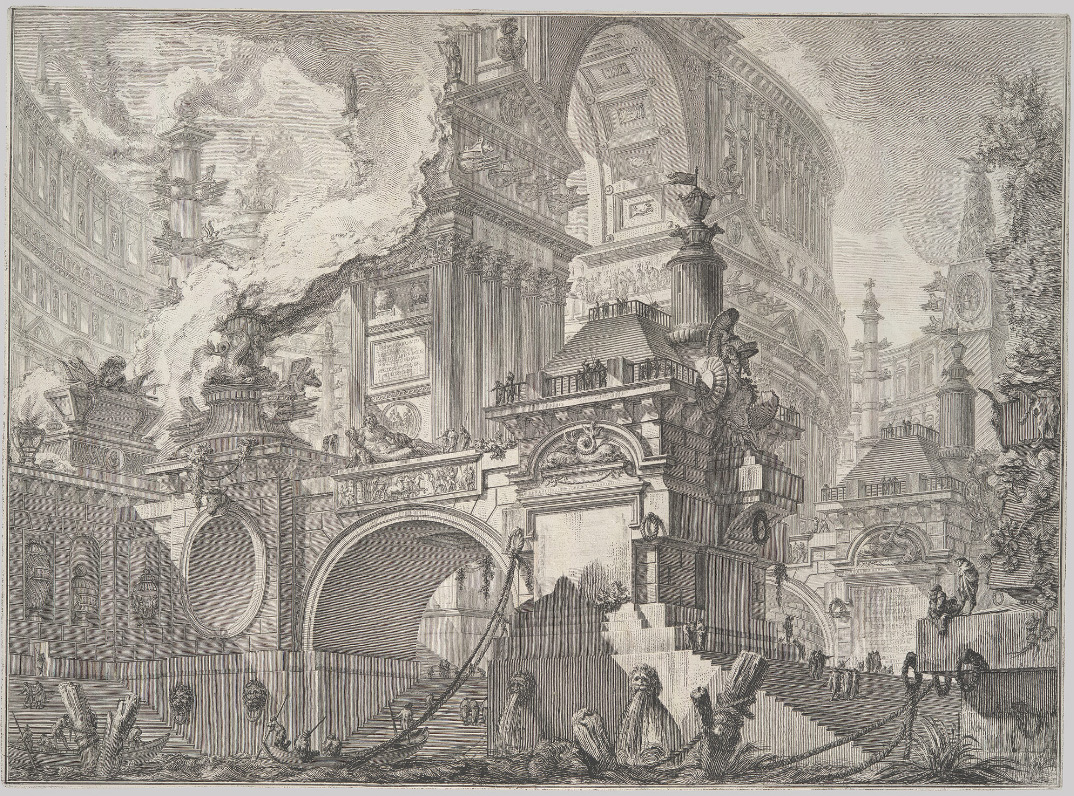
Giovanni Battista Piranesi, Part of a spacious and magnificent Harbor for the use of Romans opening into a large market square, circa 1749-50. Etching, engraving, and drypoint. Image and details courtesy of The Metropolitan Museum of Art.
“Nobody in the workshops where I went could teach me. I learned from books, lithography, and etching, all this before the found of specializing school,” as Piero explained his departure from Brera Academy of Fine Arts in Milan. He was shocked to learn the curriculum would not include what he considered the foundation of an artist’s education: the study of the nude form. Fornasetti withdrew from the academy following his vocal protest.
Taking a break from formal education, Piero worked as a cabin boy on a ship bound for Africa. Upon his return to Italy, Piero’s began creating again with renewed vigor. Included in his collection were silk scarves that caught the attention of Gio Ponti.
Finding a friend, ally, and collaborator in Gio Ponti changed Piero Fornasetti’s life. In Ponti he found a kindred spirit who encouraged Fornasetti’s creativity and designs. With confidence and support from his design community, Piero Fornasetti continued creating and dove deeper and deeper into his imagination.
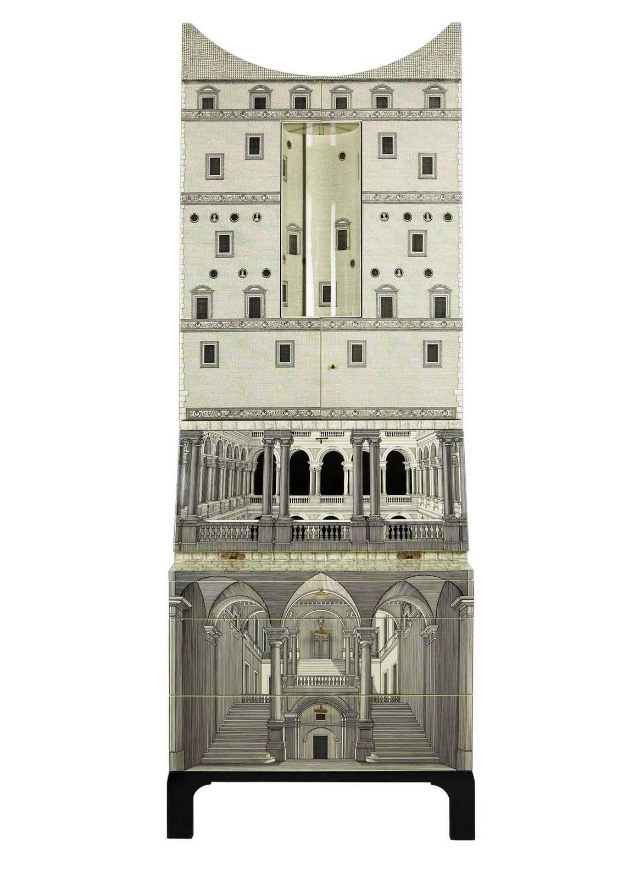
Piero Fornasetti, Architettura Cabinet, 90″ H X 32″ W X 15″ D. Lacquered wood and brass. Edition 2 of 6, 2015. Image and details courtesy of LECLAIREUR.
We are thrilled to install this Fornasetti Architettura Cabinet this fall for a client in Upstate New York. One of the things we find so fascinating about Fornasetti pieces is the way the trompe l’oeil painting draws you in for a closer look. The vivid details ensure that each observation is unique to each moment and individual.
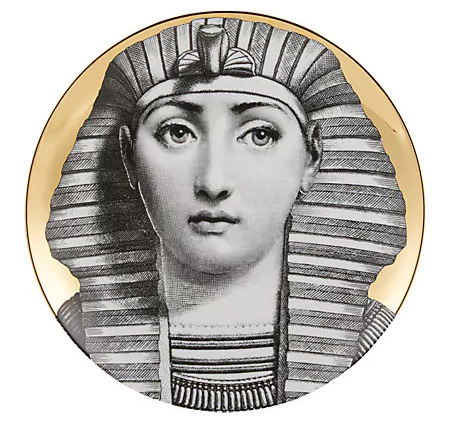
In Piero’s world Linda could be an animal, a thief, an Arab princess, or even a sphinx. Image courtesy of Barneys New York.
Piero Fornasetti’s most famous designs are that of “Theme and Variations.” For these designs, Fornasetti found constant inspiration in the face of Lina Cavalieri. Lina Cavalieri, the starring character in the 1955 film, “The Most Beautiful Woman in the World” was played by Gina Lollobrigida.
What had initially began as a curiosity sparked by a beautiful woman’s image grew into a fixation. With Lina’s open and expressionless stare, Piero would transform her identity countless times. What had started as a single plate grew into a series of over 350 pieces. Each piece was unique from the next.
What made Fornasetti stand out from his peers was his use of unique illustrations rather than creating new objects and typologies. “By repeatedly producing the same objects in the same shapes and sizes, he turned them into blank canvases for his illustrations,” explained The New York Times.
Piero Fornasetti passed away in 1988 following a routine surgery. Barnaba, Piero’s dutiful son and like-minded practitioner of practical madness, would go on to lead Fornasetti and rebuild the legacy of his father. In 1991 the Victoria and Albert Museum hosted the first posthumous international exhibition of Fornasetti’s work. The exhibition offered a richly diverse collection. It was here that Fornasetti was called a “designer of dreams.”
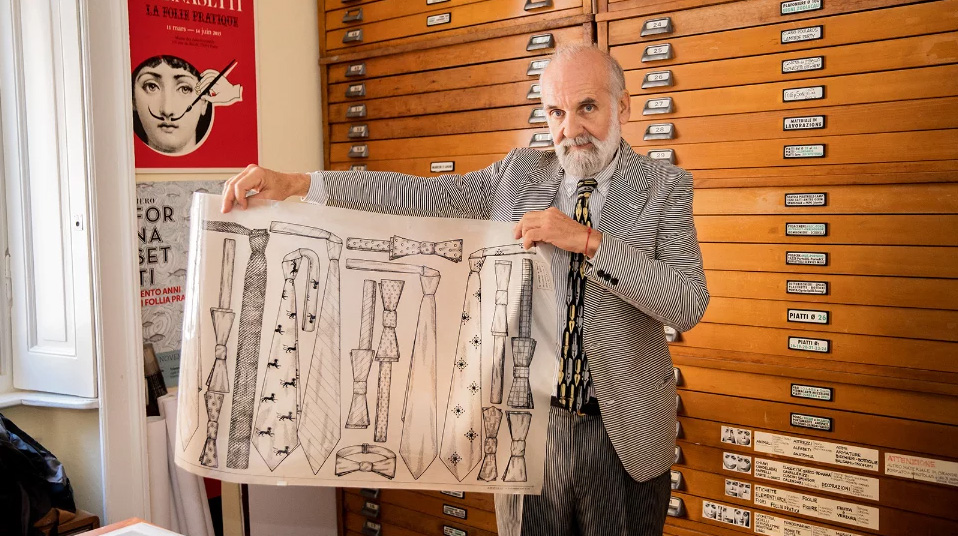
Barnaba Fornasetti, showing an example of a wallpaper collaboration done with Cole & Sons. Image and details courtesy of Mr. Porter.
In 2013, 100 years after Piero Fornasetti’s birth, Barnaba oversaw the most complete and ambitious exhibition of Fornasetti. Over 1,000 pieces comprised the Triennale Design Museum in Milan for the exhibition “100 Years of Practical Madness.” As Barnaba told Architectural Digest, the problem was not choosing what to expose, but what to exclude.
The extensive exhibition was divided into categories surveying Fornasetti’s career as a painter, printer, designer, collector, craftsman, and gallerist. Curated by Barnaba, each room related to a particular subject that contained a selection of Fornasetti objects and designs.
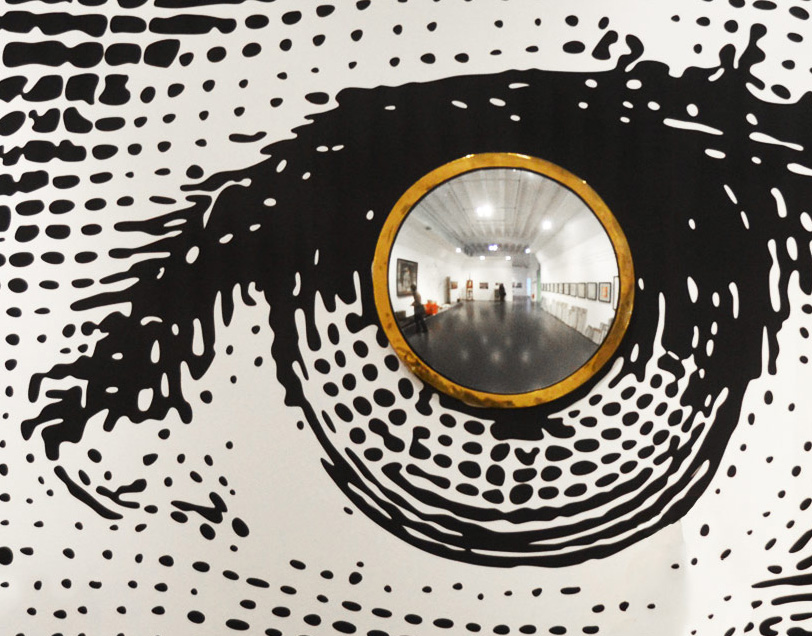
Photograph by F. Marchesi.
“I like to call this exhibition a retro-perspective – it’s not only a historical view of the man. My father designed a kind of creative system that can still be used today and in the future. It’s a method of using images from the past, from all over the world, that are already stored in our brains, then reusing them and recycling them in different ways while putting your own identity into it as well.” [Barnaba Fornasetti]
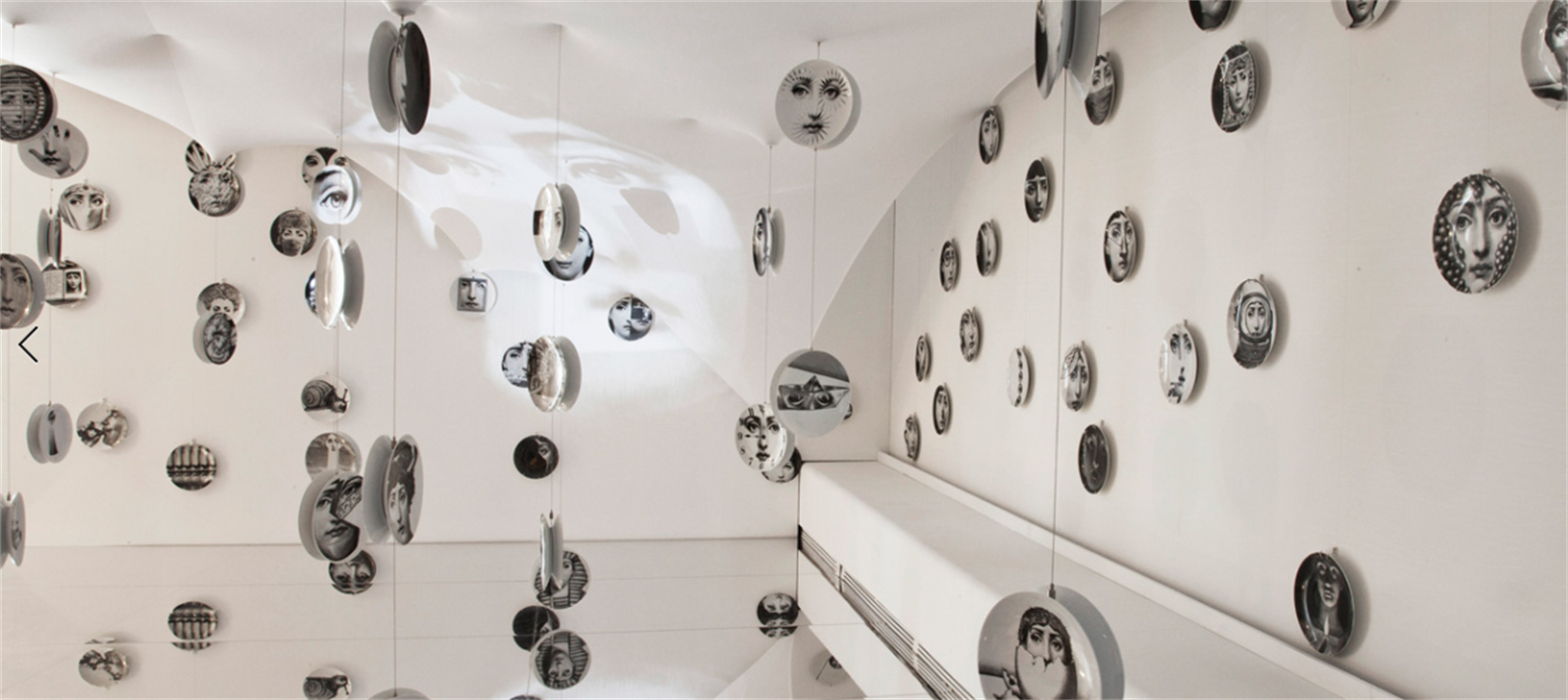
Triennale installation view of “Theme and Variations.” All plates are black and white and depict none other than Lina Cavalieri. Image courtesy of Vogue Italia.
In his lifetime Fornasetti would produce over 13,000 objects. Many of these objects are still available today for seasoned collectors and those new to the world of Fornasetti.
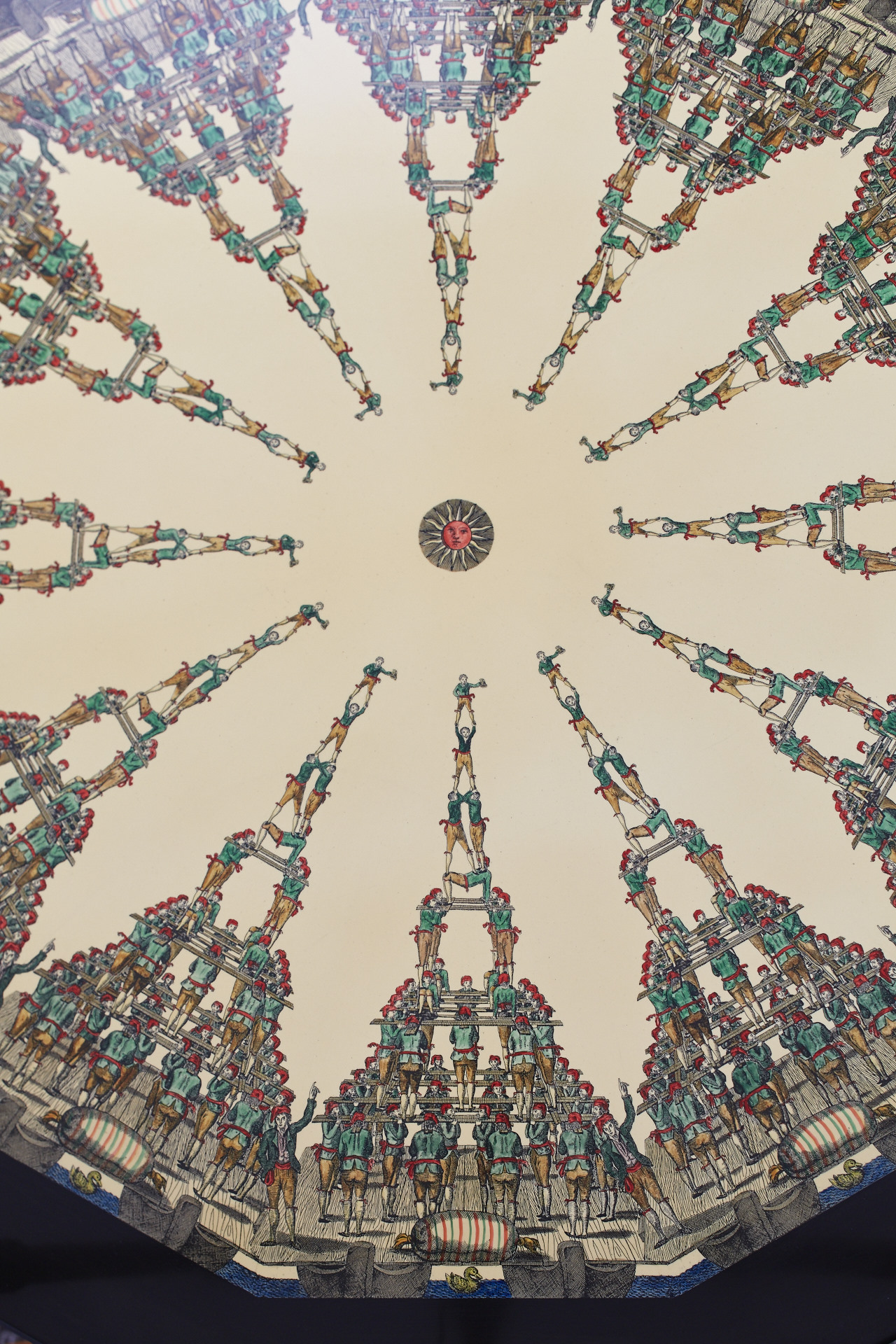
Piero Fornasetti, Game Table with lithographed wood top featuring a repeating human pyramid motif, circa 1970. 30 1/4″ H X 45″ Diameter. Image courtesy of Suzanne Lovell Inc.
We were delighted to include this wonderful Fornasetti game table in our client’s Fifth Avenue Pied-A-Terre. This circa 1970 table is a perfect example of Fornasetti’s mastery of graphic detailing and a medium for him to express his imagination.

Fornasetti, Table Top Sole Raggiante, 39″ Diameter. Image and details courtesy of Fornasetti.
We recently proposed this limited edition Table Top Sole Raggiante manufactured at the Fornasetti Atelier in Italy. This center table is a prime example of Fornasetti’s fondness for celestial designs.
We at Suzanne Lovell Inc. continue to be inspired and captivated by Fornasetti and the wildly imaginative world he has created.
